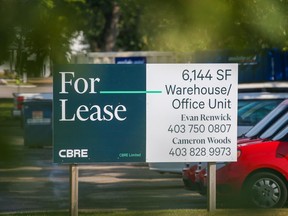'Record high activity': Calgary's industrial real estate market blossoming in 2022
Latest numbers show there is about 158 million square feet of vacancy in the city, representing a 1.5 per cent vacancy rate.

Article content
Calgary’s industrial real estate market is seeing record high activity after a COVID-19 pandemic boost, which experts say could mean more job opportunities for residents and a growing tax base for the city.
Real estate company JLL recently released national Q2 2022 insights into industrial real estate markets, including Calgary. The latest numbers show a high level of activity, with 905,410 square feet of space taken off the market as developers look to keep up with sky-high demand brought on during the pandemic.
“Calgary continues to present a viable market for national industrial occupiers and developers alike,” reads the latest JLL report.
Latest numbers show there is about 3.5 million square feet of vacancy in the city, representing a 1.5 per cent vacancy rate. By comparison, Toronto has a 0.9 per cent vacancy rate and Vancouver sits at 0.8 per cent
Ilya Raykhlin, an associate broker with Re/Max Commercial, said Calgary’s vacancy rate and location allow it to be an attractive alternative for companies needing space who want to look outside of major markets such as Vancouver and Toronto.
“Our vacancy rate as of the end of Q2 2022, and it really depends on which broker you ask, it’s hovering somewhere between 1.5 to 2.5 per cent…That is the lowest vacancy rate that Calgary has experienced since 2008,” said Raykhlin. “It’s record high activity, and it’s continuing to soar. Demand is soaring.”
Raykhlin said absorption rates are hitting record high levels as are rental rates in the city. He said the only constraint on the market at this time is having enough infrastructure to keep up with demand, adding demand around the world increased during the pandemic and grew almost entirely around e-commerce as most of the world’s population took their spending online.
“Unlike other areas of the country, Calgary is not constrained by things like mountains or the ocean and we offer level topography with development-friendly soil conditions, so we’re just a natural location to develop these large footprint facilities,” said Raykhlin.
Greg Kwong, regional managing director for the Canadian Prairies for CBRE Ltd., said all the major retail companies operating in e-commerce, such as Amazon and Canadian Tire, are either distributing through Calgary or are planning to be here.
“Virtually every major retailer that has an e-commerce base component to their business is here or looking to be here,” said Kwong. “Most of them are located along the highway, Deerfoot Trail corridor, and you can see all the signs as you drive through and around those neighbourhoods.”
Kwong said Calgary’s industrial market has historically been centred on oil and gas but there has been a shift to tailoring to other industries, such as e-commerce. He said the continued growth of investment in the region means the city will benefit from a broadening tax base and Calgarians will have access to more employment.
“The skill sets of workers are changing and we have to certainly allow through immigration and retraining of people to again be able to work in these warehouses,” said Kwong.
While continued investment and attraction in the sector could be good news for residents and for the owners of industrial real estate, Raykhlin said it could spell higher rental rates for retailers and renters.
“It’s not going to be a favourable economic climate, in that sense, for the tenants,” said Kwong.
However, JLL data show Calgary’s rental rates currently remain fairly low compared to other major markets. Over the past quarter, Calgary saw an average rate of $9.93 per square foot, compared to Toronto where rent averages $15.32 per square foot, and Vancouver, where the average rate sits around $18.70 per square foot.





Postmedia is committed to maintaining a lively but civil forum for discussion. Please keep comments relevant and respectful. Comments may take up to an hour to appear on the site. You will receive an email if there is a reply to your comment, an update to a thread you follow or if a user you follow comments. Visit our Community Guidelines for more information.